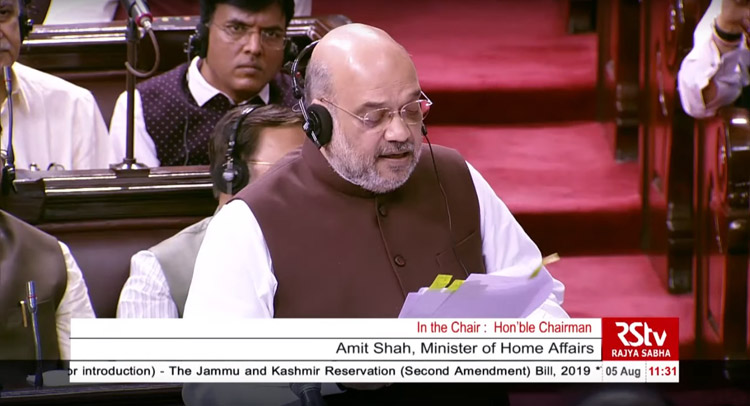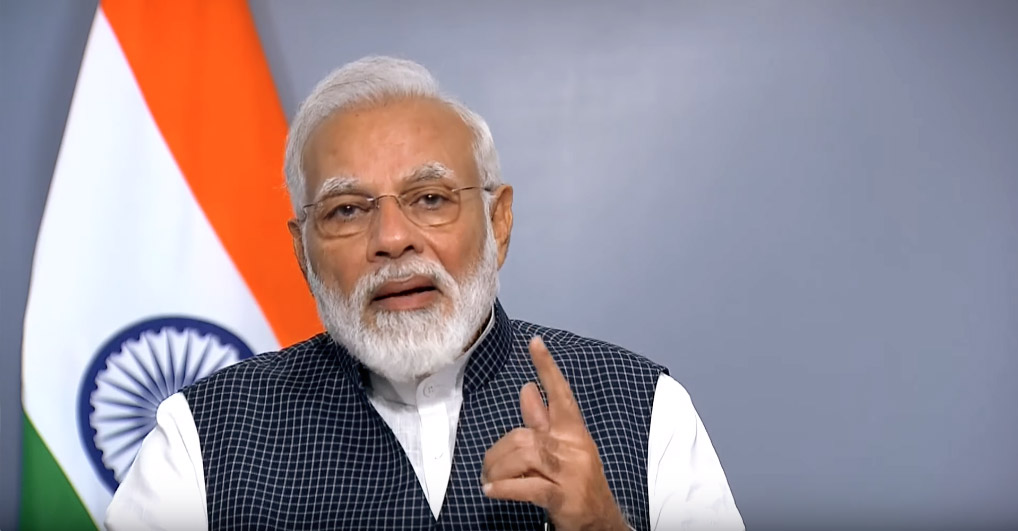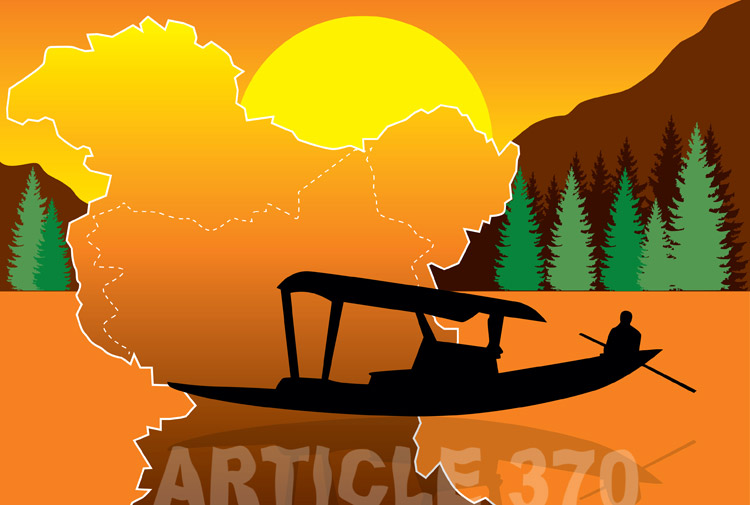INDIAN ARMED FORCES CHIEFS ON
OUR RELENTLESS AND FOCUSED PUBLISHING EFFORTS

SP Guide Publications puts forth a well compiled articulation of issues, pursuits and accomplishments of the Indian Army, over the years

I am confident that SP Guide Publications would continue to inform, inspire and influence.

My compliments to SP Guide Publications for informative and credible reportage on contemporary aerospace issues over the past six decades.
- Interim Defence Budget 2024-25 — An Analysis
- Union Defence budget 2024
- Indian Army: In quest of greater firepower and policy recommendations for gaps
- Indian Army Annual Press Conference 2024
- 6G will transform military-industrial applications
- Tata Boeing Aerospace Delivers 250 AH-64 Apache Fuselages, Manufactured in India
Article 370 Abrogation - History Corrected
Article 370 acted as a hindrance to the holistic development of J&K. The dimension of regional aspirations cannot be ignored for the state of J&K which has three clear linguistic and geographical divisions - Jammu, Kashmir Valley and Ladakh and these remain disparate despite 73 years having passed.
 |
The Author is Former Director General of Mechanised Forces, Indian Army and A Consultant with MoD |

This is history corrected, indeed the biggest ever call since independence which should have been done earlier. A new breeze of prosperity and nationalism will blow under the banner ONE INDIA, ONE FLAG & ONE CONSTITUTION. It is justice done, not a victory or a defeat, of the past wrongs and status quo by successive governments. As India emerges as a major regional power in the comity of nations, the space for despotic laws is shrinking. It has taken seven decades to get rid of draconian statutes as Triple Talaq and Article 370. The Muslim women of secular India were held hostage to the evil humiliation of triple talaq and gender inequality under Article 35A. Article 370 and 35A therein, was thus a symbol of "Kashmiri colonialism" over the rest of J&K and isolation from the country wherein fundamental rights were "legally" snatched by the state government-the right to property; right to vote; right to employment; right to marriage by choice; right to higher education; right to be a member of a panchayat or a cooperative society; right to avail bank loans.
As India emerges as a major regional power in the comity of nations, the space for despotic laws is shrinking. It has taken seven decades to get rid of draconian statutes as Triple Talaq and Article 370.
Pro-Muslim Agenda
J&K was the only state in the Indian union which had the powers to control the rights and liberties of other Indian citizens in J&K and deny RTI, thereby it legitimised this basic defiance of the Indian Constitution. It fermented a sense of exclusivity and separation from the rest of the country, which led to confrontation and religious extremism, with violence focussed against non- Muslim residents of Kashmir. Thus it created in its aftermath, the ethnic cleansing of Kashmiri Pandits and opening up a green field for Pakistan's Op Topac. Article 370 was a defining article which acted as a hindrance to the holistic development of J&K, affecting every sector. It created a constitutionally-approved apartheid, giving special political, administrative and legal powers to the ruling elite of J&K and fuelling hate, corruption and retarding prosperity and integration within India. It was anti-national, as it mentioned that persons who migrated from the state to Pakistan will be considered as state subjects for two generations, while the persons who came from balance of India will not be considered as state subjects even if they were residing in J&K. Ironically, the Muslim refugees from Xinjiang and Tibet, who had migrated to Kashmir following the Chinese occupation of their countries in 1949 and 1959, respectively, have been granted "state subject" status, along with voting rights in the Assembly by the J&K government. Thus communal agenda of Article 370 was loud and clear but few to take the strong decision in the interest of Nation Above All.

Article 370 created a constitutionally-approved apartheid, giving special political, administrative and legal powers to the ruling elite of J&K and fuelling hate, corruption and retarding prosperity and integration within India.
Geography of J&K
The nation must also see J&K as a heterogenous state comprising of Jammu, Kashmir (including POK) and Ladakh. Kashmir has 15 percent area which has Muslim majority while 85 percent area consists of Jammu and Ladakh where Hindus, Sikhs, Buddhists are in majority. Thus the dimension of regional aspirations cannot be ignored for the state of J &K which has three clear linguistic and geographical divisions - Jammu, Kashmir Valley and Ladakh and these remain disparate despite 73 years having passed. The state was being turned into a state for Muslims only and Article 370 was the instrument used to carry out nefarious ethnic cleansing. Out of the total 22 districts in the state, 16 have supported the abrogation of Article 370. Thus the call for integration is loud and clear.
Kashmir has 15 percent area which has Muslim majority while 85 percent area consists of Jammu and Ladakh where Hindus, Sikhs, Buddhists are in majority.
There is also an external dimension of Kashmir, with 45 per cent of the original state's area and 30 per cent of its population (as of October 26, 1947) having been sliced away over the years. Remember that both Pakistan and China are sitting on our territory and today voice their concerns on an internal matter of India regarding abrogation of Article 370 because it includes POK and strengthens the resolve to get back occupied territories. Pakistan has no locus-standi or moral stand against it, except highlighting its frustrations of losing grip of its nefarious designs of proxy war. Indeed, Pakistan is a discredited army running a failing nation with increasing ethnic divides, while India is a rising star in the international arena with a most professional army and a new wave of nationalism.

If Tibet is an internal matter of China so is J&K (including POK) of India.
Internal Matter
Gilgit - Baltistan, Pakistan's geopolitical loophole, remains caught in limbo; neither a province nor self-administered. The Gilgit-Baltistan Reforms Order 2018 reflected Islamabad's refusal to let go of its autocratic rule over the region and running it through ordinances from the centre. So why cannot India make Union Territories centrally controlled? Pakistan's efforts to raise the issue to the UN has already been rebuffed. As regards China and their reflected concern being Ladakh sensitive, lacks credibility with China being a beneficiary of the ceded disputed territory of J&K and its treatment of Uyghur uprising. If Tibet is an internal matter of China so is J&K (including POK) of India. The reactions from the international community have otherwise been cautious and supportive. Some like Russia, Sri Lanka, OIC and UAE have clearly stated that the issue is internal to India. USA, who was unaware of the move, has largely seen it as an internal matter and stated that it will continue to monitor the human rights situation. This shows it balancing Pakistan for its interests in Afghanistan and India for its concerns in Indo-Pacific with reference to China. The world by and large and even UN, is with us and our display of power of decision making and strategic autonomy.
The most critical challenges now entails three key facets - firstly restoration of its original demography with the return of Kashmiri Pandits, secondly development of the state based on prosperity, equality and participation of the people and lastly, the political revival of the state and credible governance based on people's mandate.
Politics of the State
Article 370 had also made the Centre and State relationship a matter of compromise politics with various sensitivities resulting in poor governance exploiting people for their own personal gains. It balanced the militants, the anti-national Hurriyat, the centre and its own political survival at the cost of the people of J&K. Politicians and others in power thrived by making terrorism an industry and accumulating disproportionate wealth, will now be answerable to central anti-corruption statutes for their corruption and nepotism. Besides, with all elements of security forces including state police coming under the center, it will result in better accountability, control and coordination of violence in Kashmir.
The historic decision of abrogation of Article 370 is a welcome change. Enough blood has flown and countless sacrifices made by our brave soldiers to ensure integrity of J&K.
Challenges
However, the most complex and critical challenge reflective of the credibility of this decision entails three key facets, firstly restoration of its original demography with the return of Kashmiri Pandits in particular who have been the victims of past ethnic cleansing, secondly development of the state based on prosperity, equality and participation of the people and lastly, the political revival of the state and credible governance based on people's mandate. The return of Kashmiri Pandits to their homeland will be conditional on the confidence they derive on the security environment to live freely and not with scars of previous memories in secluded and exclusive settlements. This mandates an environment beyond that given by the security forces, necessitating a welcome embrace by the residents of Kashmir in keeping with the culture of 'Insaniyat, Jamhuriyat and Kashmiriyat'. There is also the factor of soaring land cost investment beyond an emotional link. The development projects be it industry, tourism, higher education , health care etc would require the support and magnanimity of the central Govt to subsidise the projects and make them economically viable. Industrial investments follow only when it makes good business sense. The investment summit planned must galvanise the industry and give due impetus. Employment generation for the unemployed youth with attractive propositions must find focus as it will not only wean them away from violence but also usher an era of prosperity. Lastly it is an imperative that the present phase is only transitory, before granting statehood to Jammu & Kashmir. The political revival of the region and mainstreaming of the people as primary stake holders in the process, will be the most defining moment and must be done at the earliest.
The historic decision of abrogation of Article 370 is a welcome change. Enough blood has flown and countless sacrifices made by our brave soldiers to ensure integrity of J&K. Now that the security environment is conducive, a strong and decisive polity in place, good governance must follow. Abrogation of Article 370 is only one of the means to pave the path of national integration. The isolation of Valley and Ladakh must end. The path is challenging, time critical and the destination must not be lost. How we handle this sensitive situation particularly in Kashmir NOW could be described as a historic changing point of integration by an act of genius or an unintended but badly handled catastrophic misadventure. The people of J&K need empathy, support and demonstrated commitment for the narrative to change. Sustained, timebound and visible development impacting people in a sensitive security environment is the challenge. Failure is not an option as it will lead to a catastrophic misadventure with ever eager Pakistan pouncing for Op Topac 2.0. In the meantime, the nation must be patient, united and ready to sacrifice temporary calm for lasting peace.





